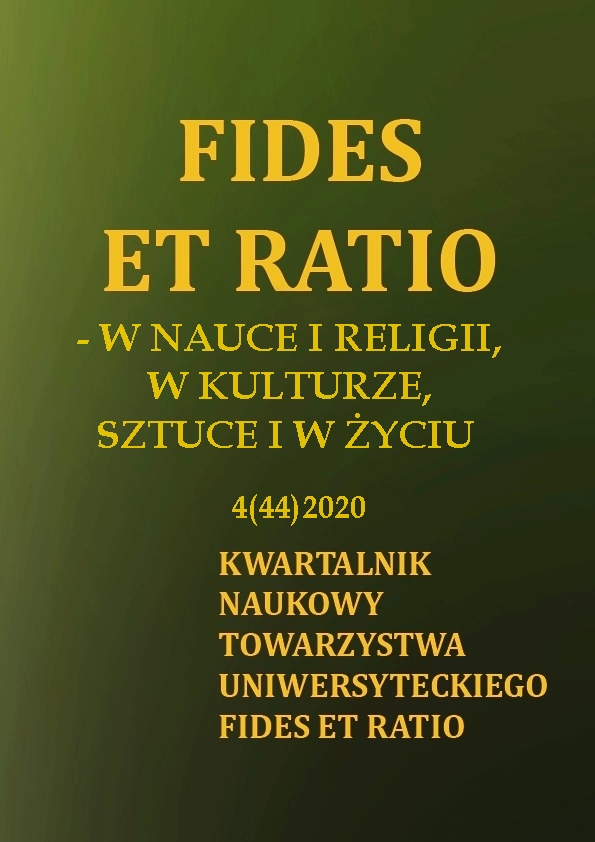Abstract
Karol Wojtyła, better known as St John Paul II, has been often called the Pope of Dialogue. In numerous speeches, he addressed the topics of ecumenical, interreligious, and intercultural dialogue. However, nowhere has it been found where he described the methodology of dialogue, and there is not one coherent document where he outlines how to achieve peace through dialogue. Nevertheless, a great many of Wojtyła’s texts, supported by the experience of his life, allow for a presentation of a hypothesis that suggests the possibility of finding a coherent, yet seemingly unobvious concept of this issue in the collection of his reflections and ideas. This work, which is a synthesis of the teaching of dialogue, also has its practical purpose. My interest lies in whether the concept of dialogue, which is present in Karol Wojtyła's thoughts, can be used as a proposal of implementation that can change social relationships, and therefore become one of the key components of innovation, although still undeveloped. I examine the possibility of being able to justify the fact that the theological teachings, which form the basis of Karol Wojtyła's method of dialogue, bring their own value to the developing directions of innovation.
References
John Paul II, (1979a). Encyclica Redemptor Hominis, Rome.
John Paul II, (1979b). Address to the United Nations; 13,14, 2nd October 1979.
John Paul II, (1980). Encyclical Dives in Misericordia, Rome.
John Paul II, (1981). Man and Woman: He Created Them. A Theology of the body, (trans.
M. Waldstein), Boston: Pauline Books & Media.
John Paul II, (1984). Apostolic Exhortation Reconciliatio et Paenitentia, Rome.
John Paul II, (1995). Encyclical Ut unum sint, Rome.
John Paul II, (2003). Roman Triptych, (trans. J. Peterkiewicz), Washington: USCCB.
Michalski K., Bonowicz W. (eds), (2010). Rozmowy w Castel Gandolfo, Warszawa-Kraków: Centrum Myśli Jana Pawła II – Znak.
Tarnowski, J. (1990). Janusz Korczak dzisiaj, (Janusz Korczak Today), Warszawa: ATK.
Tischner, J. (1990). Filozofia dramatu, Paryż: Éditions du Dialogue.
Weigel, G. (2020). Witness to hope: the biography of Pope John Paul II, New York: Harper Perennial.
Wojtyła, K. (1960). Miłość i odpowiedzialność (Love and Responsibility), Lublin: TN KUL.
Wojtyła, K. (1961). Personalizm tomistyczny, Znak, 13, 5, 664-675.
Wojtyła, K. (1972). U podstaw odnowy. Studium o realizacji Vaticanum II, (Basic of the renewal. Study on the implementation of Vatican II), Kraków: Polskie Towarzystwo Teologiczne.
Wojtyła, K. (1979b). The Acting Person (trans. J. Peterkiewicz), Dordreht, Boston, London:
D. Reidel Publishing Company.
Wojtyła, K. (1979c). Song of the Brightness of Water, (trans. J. Peterkiewicz), New York: Random House.
Wojtyła, K. (1979d). The Song of the Inexhaustible Sun, (trans. J. Peterkiewicz), New York: Random House.
Wojtyła, K. (1979e). Pieśń o Bogu ukrytym, (Song of the Hidden God), (trans. J. Peterkiewicz), Dordreht, Boston, London: D. Reidel Publishing Company.
Wojtyła, K. (1989). Brat naszego Boga, [The Brother of our God], Kraków: Wydaw. Świętego Stanisława BM Biskupa Męczennika Archidiecezji Krakowskiej.
Wojtyła, K. (1997). Przed sklepem jubilera, (The Jeweller’s Shop), Kraków: Oficyna Wydawnicza Impuls.
Wojtyła, K. (2007). Wykłady lubelskie, Warszawa: Wydawnictwo KAI.
Wojtyła, K. (2019). Dzieła literackie i teatralne, (w:) J. Popiel, (ed.), Juwenilia (1938-1946), t. I, Kraków: Znak.

